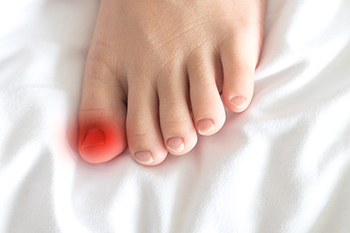Ingrown Toenails in Children
Tuesday, 14 March 2023 00:00
As with adults, if a baby’s nails are trimmed too short or left to grow too long, or if their shoes or socks are too tight, they can develop an ingrown toenail. An ingrown toenail is a nail that presses or grows into the skin on the corner or side of the toenail. While this can happen on any toe, it is most common on the big toe. An ingrown toenail can be red, swollen, and painful. If not promptly treated, an infection can result. It may help to soak the child’s foot in warm, soapy water a few times a day and have them wear looser-fitting shoes outdoors or go barefoot indoors. However, it is suggested that if you notice signs of an ingrown toenail in your child, you should not try to pry their nail away from the skin, but see a podiatrist as soon as possible.
Ingrown toenails may initially present themselves as a minor discomfort, but they may progress into an infection in the skin without proper treatment. For more information about ingrown toenails, contact Dr. Steven Schwartz of Pennsylvania. Our doctor can provide the care you need to keep you pain-free and on your feet.
Ingrown Toenails
Ingrown toenails are caused when the corner or side of a toenail grows into the soft flesh surrounding it. They often result in redness, swelling, pain, and in some cases, infection. This condition typically affects the big toe and may recur if it is not treated properly.
Causes
- Improper toenail trimming
- Genetics
- Improper shoe fitting
- Injury from pedicures or nail picking
- Abnormal gait
- Poor hygiene
You are more likely to develop an ingrown toenail if you are obese, have diabetes, arthritis, or have any fungal infection in your nails. Additionally, people who have foot or toe deformities are at a higher risk of developing an ingrown toenail.
Symptoms
Some symptoms of ingrown toenails are redness, swelling, and pain. In rare cases, there may be a yellowish drainage coming from the nail.
Treatment
Ignoring an ingrown toenail can have serious complications. Infections of the nail border can progress to a deeper soft-tissue infection, which can then turn into a bone infection. You should always speak with your podiatrist if you suspect you have an ingrown toenail, especially if you have diabetes or poor circulation.
If you have any questions, please feel free to contact our offices located in Chambersburg, and Mcconnellsburg, PA . We offer the newest diagnostic and treatment technologies for all your foot care needs.

